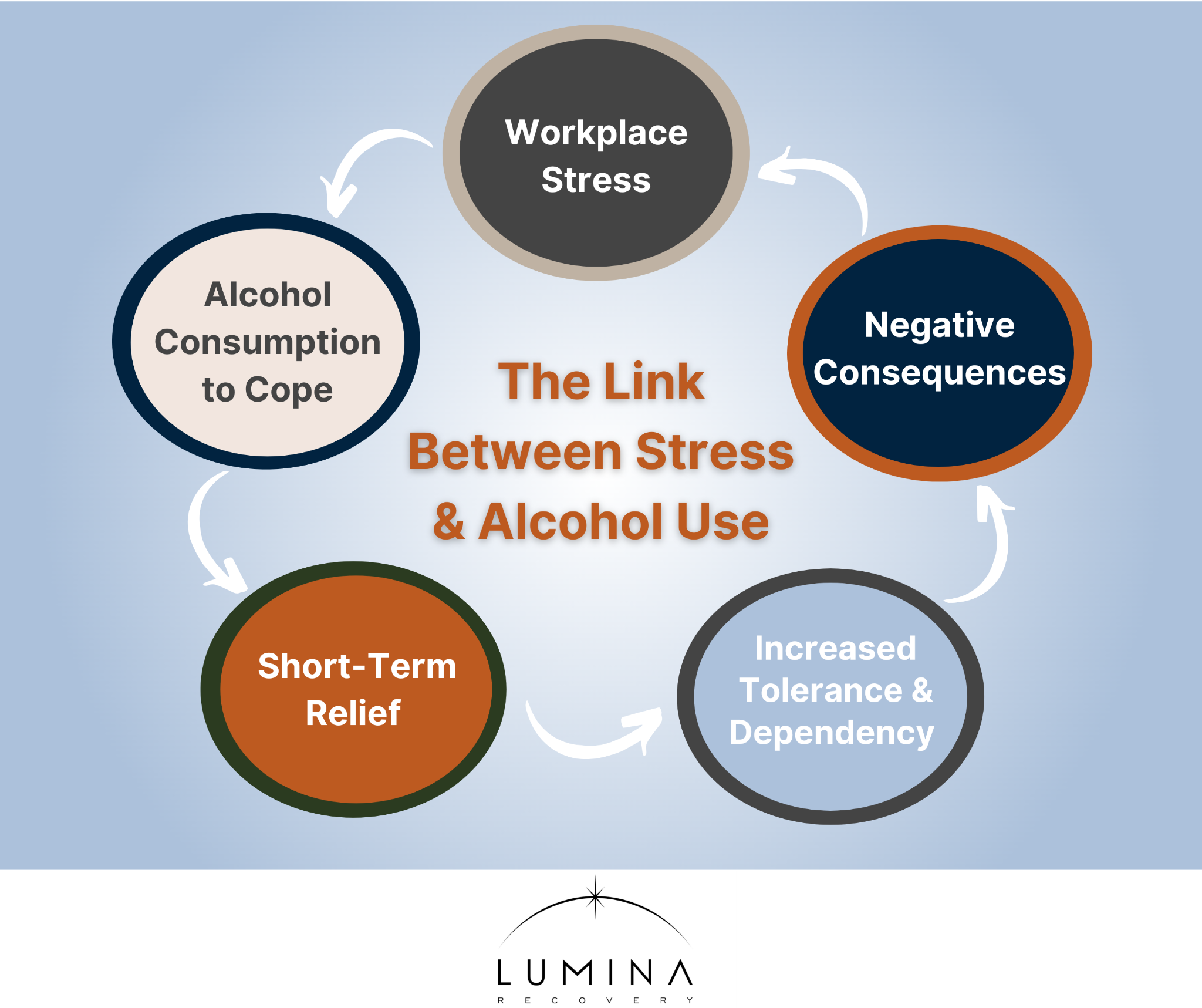Many professionals face high levels of stress in their work environments, leading some to turn to alcohol as a coping mechanism. Long hours, tight deadlines, and emotionally demanding roles can lead individuals to seek relief through drinking.
However, this habit can evolve into unhealthy patterns, negatively impacting both personal and professional lives. Understanding the connection between occupational stress and drinking is crucial for employees and employers alike to promote healthier workplaces and individual well-being.
What Is Work-Related Stress?
Occupational stress arises when job demands exceed an individual’s capacity to cope. Common sources include:
- Heavy Workloads: Excessive responsibilities with insufficient time can overwhelm employees.
- Tight Deadlines: Constant pressure to meet deadlines can heighten stress levels.
- Job Insecurity: Uncertainty about job stability can lead to chronic anxiety.
- Workplace Conflicts: Interpersonal issues with colleagues or supervisors can create a tense environment.
- Lack of Control: Having little influence over work tasks or decisions can contribute to feelings of helplessness.
Physiological and Psychological Effects
Chronic stress impacts both body and mind, leading to:
- Physical Symptoms: Headaches, high blood pressure, and a weakened immune system
- Mental Health Issues: Increased risk of anxiety, depression, and burnout
- Behavioral Changes: Unhealthy coping mechanisms, such as substance use, including alcohol
The Link Between Stress and Alcohol Use
Many individuals turn to alcohol as a means of dealing with workplace stress. Drinking at work or immediately after a stressful day may seem like an easy way to relax, but it often contributes to a destructive drinking cycle.
Alcohol is a depressant that temporarily alleviates stress and anxiety, but frequent use as a coping mechanism can lead to dependency.
This creates a dangerous cycle where individuals consume alcohol to manage stress, only to find that the long-term effects like poor sleep, increased anxiety, and reduced cognitive function make work-related stress even harder to handle.
Impact on Health
Using alcohol to manage stress can lead to severe health issues, including:
- Worsening mental health. Alcohol can intensify anxiety and depression.
- Physical health risks. Alcohol is related to an increased likelihood of liver disease, cardiovascular issues, and a weakened immune system.
- Risk of addiction. Regular use can lead to alcoholism and work performance issues, creating a drinking cycle that becomes difficult to break.
High-Risk Professions
Certain stressful professions have high rates of substance abuse. Some of these careers include:
- First Responders: Police officers and firefighters often face traumatic events, elevating their risk for stress-related alcohol use.
- Healthcare Workers: Long hours and high-pressure situations can lead to increased alcohol consumption as a coping mechanism.
- Hospitality Industry: Easy access to alcohol and irregular hours may contribute to higher consumption rates, sometimes even drinking while at work.
- High-Level Professionals: Executives and corporate professionals often experience extreme stress, contributing to addiction among high-level professionals.
- Construction and Transportation: Physically demanding work and safety risks are associated with increased alcohol use.
Consequences of Alcohol Use in the Workplace
The impact of alcohol use in professional settings extends beyond the individual, affecting job performance, workplace relationships, and overall company efficiency. Understanding these consequences is crucial for both employees and employers to foster a healthier work environment.
Individual Impacts
- Health Risks: Chronic diseases such as liver cirrhosis and heart problems
- Mental Health Deterioration: Increased anxiety, depression, and risk of developing substance use disorders
- Personal Relationships: Strained interactions with family and friends due to behavioral changes
Professional Impacts
- Decreased Performance: Impaired judgment and reduced productivity
- Absenteeism: Increased sick days and unreliability
- Job Loss: Potential termination due to poor performance or policy violations
Organizational Impacts
- Financial Costs: Higher healthcare expenses and potential legal liabilities
- Reduced Productivity: Overall decline in team efficiency and morale
- Safety Concerns: Increased risk of accidents, especially in high-risk industries
Alcoholism and the Workplace: Drinking at Work and Its Risks
Workplace drinking, whether it happens in social settings or in secrecy, can have serious consequences. Some professionals engage in drinking while at work to manage stress or cope with overwhelming demands. However, alcohol use in a professional setting increases the risk of accidents, lowers productivity, and damages workplace relationships.
For those in high-pressure jobs, alcoholism and the workplace often go hand in hand when alcohol becomes a primary way to handle daily stressors.
Strategies for Prevention and Support
Managing workplace stress and drinking requires a proactive approach from both individuals and employers. Implementing healthy coping mechanisms and fostering a supportive work culture can help break the drinking cycle and create a more productive environment.
For Individuals
- Try healthy coping mechanisms. Engage in regular exercise, mindfulness practices, and hobbies
- Consider a career change. If your job is a major source of stress, explore low-stress careers for a healthier lifestyle that supports long-term well-being.
- Seek professional help. Try counseling or therapy to develop effective stress management strategies.
- Find social support. Maintain connections with friends, family, or support groups to share experiences and advice.
- Set boundaries. Avoid workplace drinking and establish limits on alcohol consumption outside of work hours.
- Balancing treatment with work. Managing recovery while maintaining job responsibilities can be challenging so it’s essential to learn how to balance work and treatment.
For Employers
- Use employee assistance programs (EAPs). Provide resources for counseling and support.
- Promote work-life balance. Encourage reasonable work hours and offer flexible scheduling when possible.
- Create a supportive culture. Foster an environment where employees feel comfortable discussing stress and seeking help.
- Implement strict alcohol policies. Discourage drinking at work and ensure a safe, professional environment.
FAQs
Is there a correlation between stress and alcohol consumption?
Yes, chronic stress can lead individuals to use alcohol as a coping mechanism, increasing the risk of developing alcohol use disorders.
How does alcohol affect job performance?
Alcohol consumption can impair cognitive and motor functions, leading to decreased productivity, increased absenteeism, and a higher likelihood of workplace accidents.
Is workplace stress a trigger for alcohol and drug abuse?
Yes, high levels of workplace stress can contribute to the initiation and continuation of substance use as individuals seek to manage their stress.
Navigate Stress and Alcohol Use With Lumina Recovery
Understanding the intricate link between high-stress occupations and alcohol use is vital for fostering healthier work environments and promoting individual well-being. Recognizing risk factors and implementing effective stress management strategies can mitigate the adverse effects of workplace stress.
Lumina Recovery offers specialized services, including outpatient programs for flexible support and dual diagnosis treatment for co-occurring mental health disorders, to address these challenges effectively.
If you or someone you care about is facing challenges with alcohol use due to workplace stress, contact Lumina Recovery today to take the first step toward a healthier, sober life.




